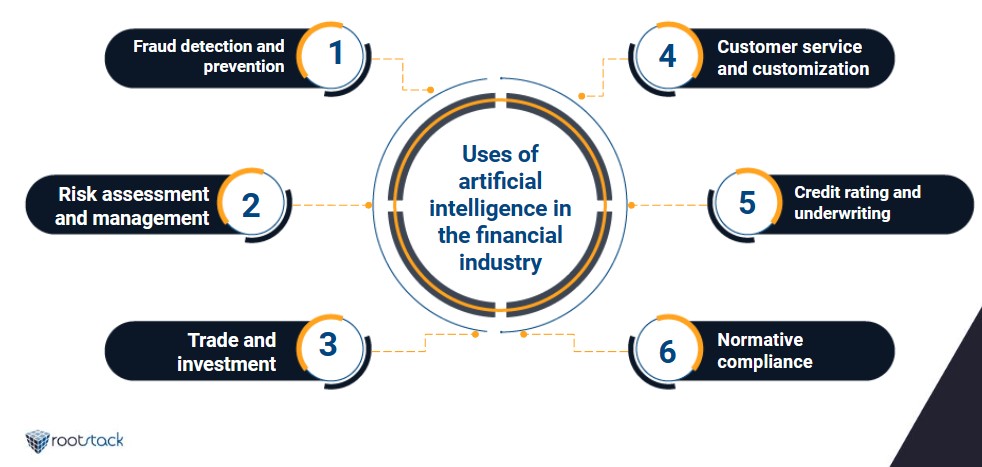Investigating the Impact of Artificial Intelligence in Financial Services
June 28, 2023
Table of contents
Quick Access

Artificial intelligence is a technology that can benefit any industry in a variety of ways, including enhanced production and an impact on sales and services. One of them is the finance and banking industry.
The use of ChatGPT, for example, demonstrates the popularity of AI, with millions of individuals around the world benefiting from it as a personal assistant, a source of knowledge, assistance with study documents, or simply as a chat with which they can socialize.
For the financial industry, having a technology like GPT might mean a significant improvement in terms of customer care and service, allowing it to give its users the rapid attention they deserve and increasing the institution's reliability.
Artificial intelligence's impact on the banking industry
Artificial intelligence (AI) has had a huge impact on the financial industry, transforming a variety of financial areas. According to a 2020 survey of finance professionals, 83% perceive AI as a technology that will allow their institutions to be more productive and competitive.
"In 2021, most financial services companies incorporated artificial intelligence (AI) only moderately into their operations or functions. Around one-third of respondents reported fully incorporating artificial intelligence technologies into their business," according to another of Statista's research in the topic.

Artificial intelligence applications in finance
Here are a few significant areas where AI has made a difference:
Detection and prevention of fraud
AI systems can scan massive volumes of data in real time to uncover trends and abnormalities, assisting in the detection and prevention of fraudulent conduct. AI can discover unusual trends, flag questionable transactions, and reduce false positives by analyzing past transaction data, enhancing the accuracy and efficiency of fraud detection systems.
Risk evaluation and management
AI-powered algorithms can evaluate complex financial data and market patterns to assess and manage risk more efficiently. AI models can provide insights into prospective market swings, credit risk, and investment strategies by evaluating historical data, assisting financial organizations in making informed decisions.
Investment and trade
Trading and investment techniques have been altered by artificial intelligence. AI-powered automated trading systems may execute trades with great speed and precision, using massive volumes of data and making judgments based on pre-defined rules. Artificial intelligence may also evaluate market data, news sentiment, and social media trends to uncover investment opportunities, optimize portfolios, and reduce risk.
Customization and customer service
Chatbots and virtual assistants driven by AI have enhanced customer service in the finance business. These sophisticated systems are capable of handling consumer enquiries, making customized recommendations, and assisting with account administration. Natural Language Processing (NLP) allows chatbots to understand and reply to client enquiries, increasing customer happiness and decreasing the need for human engagement.

Credit evaluation and underwriting
Credit scoring and underwriting processes have been changed by artificial intelligence. To effectively assess creditworthiness, machine learning algorithms can examine massive volumes of data, including credit histories, income levels, and other pertinent aspects. This enables financial organizations to make faster and more accurate credit judgments, increasing lending availability and lowering the risk of default.
Normative adherence
The financial industry is highly regulated, and artificial intelligence plays a critical role in maintaining compliance. AI can assist firms stay up with evolving regulations by automating compliance operations, monitoring transactions for suspicious behavior, and monitoring transactions for suspicious activity. Financial organizations can improve compliance operations and minimize expenses associated with manual monitoring and reporting by employing AI.
Data analysis and forecasting
AI systems can mine vast amounts of financial data for facts, trends, and patterns that people may miss. This assists financial firms in making data-driven decisions, forecasting market movements, and developing more accurate forecast models.
While AI has significant benefits for the financial industry, it also has drawbacks such as ethical concerns, algorithm bias, data privacy concerns, and cybersecurity issues. As a result, while using AI systems in finance, firms must provide openness, fairness, and effective security measures.
We recommend you on video
Related Blogs


How to integrate UiPath RPA with a database

Magento Development Services for the Healthcare Industry
Best Practices for Hiring a Drupal Developer

5 steps of UiPath RPA implementation

